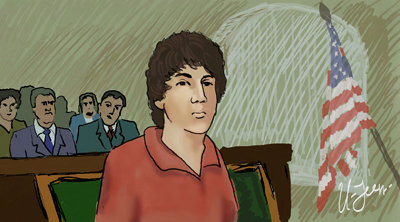MOSCOW, February 13 (RAPSI, Ingrid Burke) – A jury trial is set to commence in the US case against Boston Marathon bombing suspect Dzhokhar Tsarnaev on November 3 of this year, according to a note appended to the defendant’s docket Wednesday.
Prosecutors anticipate that the trial will span approximately 12 weeks, and that if Tsarnaev is convicted the sentencing hearing will require an additional six weeks, as explained in a status report filed jointly by the prosecution and defense Monday.
Following the recent decision by US prosecutors to pursue the death penalty against Tsarnaev, the defense team sought a start date no earlier than September 2015.
The parties are presently butting heads over whether automatic discovery has reached completion; prosecutors claim it has, while the defense team begs to differ. Under US law, discovery is the process by which both parties to a dispute can obtain information from each other, including the production of documents and other types of evidence.
The defense team claims that several requests from the prosecution for discovery remain outstanding. In one case, the defense claims to have requested copies of various items that prosecutors had made available for inspection. The prosecution allegedly agreed, but has not yet complied.
Physical evidence still tied up with the US law enforcement authorities remains a major issue for the defense. According to the document, “The defense has not yet had an opportunity to review numerous additional items of physical evidence, including nearly 2,000 items that reportedly are still being analyzed by the FBI and items kept at additional locations.”
US prosecutors filed their notice of intent to pursue the death penalty against Tsarnaev on January 30.
In addition to asserting various statutory threshold findings that they argue justify the decision to pursue the death penalty against Tsarnaev, prosecutors advanced a variety of aggravating factors contributing to the decision, ranging from the vulnerability of the Boston Marathon bombing’s youngest victim, to Tsarnaev’s apparent lack of remorse.
Among these factors, the notice asserts: “[Tsarnaev] received asylum from the United States; obtained citizenship and enjoyed the freedoms of a United States citizen; and then betrayed his allegiance to the United States by killing and maiming people [there].”
The notice of intent adds that Tsarnaev was not a minor (under the age of 18) when the attacks occurred. In fact, he had been 19 at the time.
On the afternoon of April 15, two explosions occurred near the finish line of the Boston Marathon. IEDs devised from pressure cookers, low explosive powder, shrapnel, adhesive, and other materials were hidden in backpacks that were then placed near metal barricades in areas packed with hundreds of spectators.
According to a related indictment, “Each explosion killed at least one person, maimed, burned and wounded scores of others, and damaged public and private property, including the streets, sidewalk, barriers, and property owned by people and businesses in the locations where the explosions occurred.” The three individuals killed during the bombing were Krystle Marie Campbell, Lingzi Lu, and Martin Richard.
Tsarnaev was arrested following a dramatic manhunt, the events of which killed his brother and co-suspect Tamerlan, and claimed the life of an MIT Police Officer Sean Collier. He was charged in a criminal complaint dated April 21 with the use of a weapon of mass destruction and malicious destruction of property resulting in death.
Then on June 27, a federal grand jury returned a 30-count indictment against Dhzokhar, charging him with a plethora of charges related to the bombings and the MIT officer’s death.
According to the prosecution notice filed Thursday, counts one through ten and twelve through eighteen “are such that, in the event of a conviction, a sentence of death is justified.” The counts referenced in the memo include: the use of a weapon of mass destruction resulting in death (two counts), the bombing of a public place resulting in death (two counts), the malicious destruction of property resulting in injury and death (two counts), the possession and use of a firearm resulting in death (nine counts), and two counts of conspiracy.
At an arraignment hearing on July 10, Dzhokhar pleaded not guilty to all charges pending against him.



